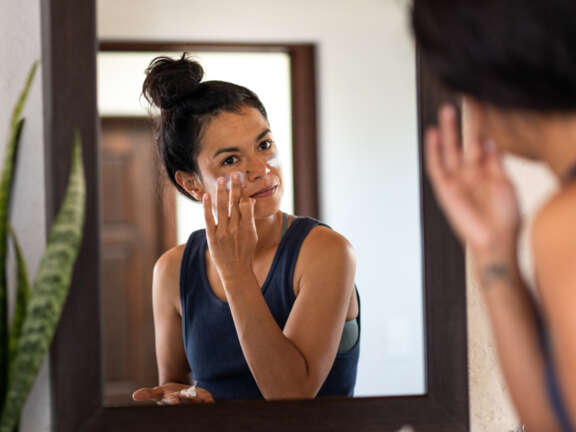Beat the Heat: Your Heat Illness Prevention Plan


As temperatures soar during the summer months, so does the risk of heat-related illnesses—some of which can sneak up on you more quickly than you might think.
Yet, that doesn’t mean you have to stay inside and avoid your favorite activities. Your best defense is to know the symptoms of the three most common heat-related illnesses—dehydration, heat exhaustion, and heat stroke.
Plus, there are preventative steps you can take to keep yourself from overheating in the first place. Here’s what you need to know.
Preventing Dehydration
Dehydration occurs when your body loses more fluids than it takes in. It can happen gradually over time, especially in hot weather and when you’re physically active. Left untreated, dehydration can lead to cramps, heat exhaustion, and heat stroke.
Symptoms of dehydration can include:
- Thirst
- Dry lips and mouth
- Fatigue
- Dark urine
- Dizziness
- Trouble concentrating
- Rapid breathing
- Headaches
To avoid dehydration, drink plenty of water throughout the day. It’s also important to increase your fluids as temperatures climb and if you’re exercising and sweating. You also will want to replenish your electrolytes with an electrolyte drink or fruits like oranges and bananas.
If you suspect dehydration, you want to rehydrate immediately by drinking plenty of water, as well as electrolyte-rich fluids like sports drinks. You want to also avoid caffeine and alcohol since they can cause further dehydration. Plus, you want to rest in a cool, shaded area until symptoms subside.
Keeping Heat Exhaustion at Bay
Heat exhaustion occurs when your body overheats and is losing fluids and electrolytes more rapidly than you’re replacing them.
Symptoms of heat exhaustion can include:
- Heavy sweating
- Weakness or fatigue
- Nausea or vomiting
- Headache
- Dizziness or lightheadedness
- Cool, clammy, moist skin
- Muscle cramps
- Elevated heart rate
If someone is experiencing heat exhaustion, it's important to take quick action. Move them to a cooler spot and encourage them to drink cool water or sports drinks.
You also want to help them loosen tight clothing and apply cool compresses to help lower body temperature. If the symptoms persist or worsen, seek medical attention immediately.
If left untreated, heat exhaustion can lead to a heat stroke.
Heat Exhaustion vs. Heat Stroke Symptoms
Heat stroke is the most severe heat-related illness. It occurs when your body is unable to regulate your internal temperature due to extreme heat, causing body temperature to rise to 104° F (40° C) or higher.
Unlike heat exhaustion, which can be self-treated, heat stroke symptoms signal a medical emergency and require immediate attention.
Heat stroke symptoms can include:
- High body temperature
- Hot, dry skin (lack of sweating)
- Rapid pulse
- Confusion or loss of consciousness
- Seizures
If you suspect someone is having a heat stroke, call 911 immediately. Without medical intervention, heat stroke can lead to organ damage, brain damage, and even death.
While you’re waiting for help to arrive, take immediate steps to cool the person down. Move them to a cooler place, remove excess clothing, and apply cold water or ice packs to their body. Do not give fluids if the person is unconscious or unable to swallow.
To Stay Cool, Prevention Is Your Best Defense
The best way to prevent heat-related illnesses is to have your own heat illness prevention plan:
- Stay hydrated: Drink plenty of fluids, even before feeling thirsty. Plus, make sure you’re replenishing electrolytes if you’re sweating.
- Avoid prolonged heat exposure: This is especially important during the peak hours of 10 am to 2 pm. You may also want to stay indoors and delay outdoor activities during high heat index days.
- Dress for the heat: Wear lightweight, loose-fitting clothing and a wide-brimmed hat when outdoors.
- Take frequent cooling breaks: Step out of the heat and cool off in shaded or air-conditioned areas.
If you or someone near you is experiencing symptoms of dehydration, heat exhaustion or heat stroke, it’s important to take quick action. But with all these tips and mind, you are better prepared to enjoy summer safely!
